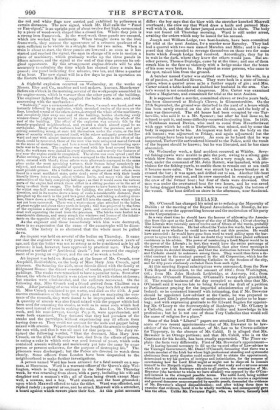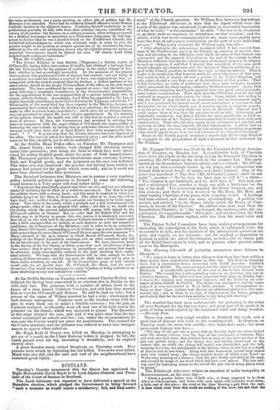IRELAND.
Mr. O'Connell has changed his mind as to refusing the Mayoralty of Dublin : at the meeting of the Repeal Association, on Monday, he an- nounced at once the approaching honour and the moderation of his party in the Corporation— In a very short time he should have the honour of adclresting the Associa- tion from this spot as the Lord Mayor of the city of Dublin. (Great cheering.) The Liberals were tolerably sure of twelve out of fifteen of the wards, probably they would have thirteen. He had offered the Tories five wards, but a question was raised as to whether be could have worked out this promise. He would have succeeded : he would have gone from ward to ward calling upon the bur- gesses to agree to this ; and he had no doubt they would have placed sufficient confidence in his advice. The power of nominating a Lord Mayor would be in the power of the Liberals ; in fact, they would have the entire patronage of the Corporation : but he would pledge himself, that after three meetings it would prove its decided liberality, and that the distinction between Protestant- and Catholic should be unknown among them. They would thus form a de- cided contrast to the conduct pursued in the old Corporation, which has for fifty years had the power of admitting Catholics to the freedom of the city, and for fifty years studiously excluded them from such right. At this meeting Repeal subscriptions were announced, from the New York Repeal Association, to the amount of 1001. ; from Washington, 601.; from Mr. John Hesketh Lethbridge, at Antwerp, 101.; from Henrietta O'Connell Fitzsimon, O'Connell's twenty-first grandchild, I/. The routine business of the day occupied so much time that Mr. O'Connell said it was too late to bring forward the draft of a petition to Parliament praying for the impartial administration of justice in Ireland : so he contented himself with intimating, that if Mr. Brewster should be appointed Law-adviser at the Castle, he was prepared to declare Lord Eliot's professions of moderation and justice to be hum- bug ; and with expressing gratitude to Sir Edward Sugden for appoint- ing Mr. O'Leary to the Secretaryship of Bankrupts : " Mr. O'Leary is a Catholic, and a man of considerable ability and knowledge in his profession ; but he is not one of those Tory Catholics that would sell the name of religion for a place."
Some of the Irish " Liberal" papers are attacking Lord Eliot on the score of two recent appointments—that of Mr. Brewster to be law- adviser of the Crown, and another, of Mr. Lee to be Crown-solicitor for Tipperary, in the absence of Mr. Cahill. It is alleged that Mr. Brewster is an Orange partisan; and that Mr. Cahill, who is on the Continent for his health, has been cruelly superseded. The Times ex- plains the facts very differently. First of Mr. Brewster's appointment- " It having become necessary to fill up the vacated office of Law-adviser to the Viceregal Government, Mr. Daniel O'Connell, foreseeing that there was a certain member of the Irish bar whose high professional standing and systematic abstinence from party disputes could scarcely fail to obtain the appointment, determined to try his powers of intrigue and intimidation, for the purpose of ascertaining how far Lord Eliot might or might not be dispce ed to commit himself to the Morpeth regime. By means of that ready and courteous access which the new Irish Secretary extends to all parties, the nomination of Mr. Brewster (the barrister to whom we have alluded) was opposed by the O'Con- nell interest in the strongest possible terms. The noble Lord, being neither disinclined to sustain reasonable objections, nor content to receive a capricious and general demurrer unaccompanied by specific proofs, demanded the evidence of Mr. Brewster's alleged disqualification; and after taking three days to examine that evidence, found it to be wholly worthless, and consequently gave him the office. Unlike Mr. Precursor Pigott, who, we believe, formerly held
the same preferment, not a party-meeting on either side of politics had Mr. Brewster ever attended. Never had he rendered himself offensive to his Roman Catholic brethen in the slightest degree. Confining himself exclusively to his professional pursuits, he had, with more than ordinary success, conciliated the esteem of all parties : but because on a solitary occasion, when acting as counsel for a Radical newspaper in opposition to a Protestant clergyman, he had hap- pened to declare that he was a decided friend to the Established Church, this incidental acknowledgment, which was obviously made in order to give the greater weight to his position as arrayed against one of its ministers, has been adduced as the sole and satisfactory reason why his rightful prospects under an impartial Government should be blasted for ever. Of course, Lord Eliot despised such malignant balderdash." Then Mr. Cahill's case-
" The Crown Solicitor in that district, [Tipperary,] a furious zealot of O'Connell's, having fallen into serious ill health, had obtained a furlough from the late Government for the purpose of residing in the milder climate of Lis- bon; whither he had accordingly proceeded. At the accession of the present Government, this gentleman's term of absence had expired ; and not being in a condition to resume his duties, a renewal of leave was requested for him ac- companied with the modest proposal that his brother, a violent partisan Of the same school, should do the proper O'Connellism of the office, as the sick man's substitute. The leave petitioned for was granted at once; but the latter pro- posal, inferring a temporary transference of the Government's responsibility for the appointment to the non-responsibility of a private individual, was, of course, politely declined. Accordingly, Lord Eliot has appointed a Mr. Lee, a highly reputable practitioner, to be Crown Solicitor for Tipperary ad interim.* * Inhumanity of the worst kind has been imputed to the Ministry, because, on announcing their refusal to take the brother as a substitute, the Lisbon patient made an offer to return home immediately ; which offer, for an obvious reason, was not permitted to cancel Mr. Lee's interim appointment. By the showing of the patient himself, his health was still so bad that he required a renewed leave of absence. If, then, the Government had persisted in ordering him home in compliance with the eager wishes of O'Connell, the responsibility of hastening the man's death by forcing him to undertake labours for which he is unequal would have been laid at Lord Eliot's door with unappeasable viru- lence. * • * It is not true that the Lisbon absentee has been deprived of his office. The leave he asked has been humanely given ; and the office is still reserved for him, should he yet be able to undertake it."
At the Dublin Head Police-office, on Tuesday, Mr. Thompson and Mr. James Garry, two cutlers, were charged with obtaining money under false pretences ; that being the form in which they were prose- cuted for selling English goods under the name of Irish manufactures. Mr. Thompson agreed in future to discriminate more correctly between Irish and English goods, and the judgment on his case was deferred. The other case was dismissed: the account not having been settled, no money had passed for the goods which were sold ; and so it could not have been obtained under false pretences.
The Standard intimates that Ministers are to pursue a very crushing policy towards political agitators in Ireland: to some the following sound lessons in a Tory paper will read rather oddly-
" Experience has abundantly proved that there are two, and but two effectual modes of obviating the ill effect of a seditious movement. The first is to put the sedition down with a strong hand ; and this must be resorted to when im- mediate danger to the State is threatened. The other is to leave the evil to burn itself out; neither feeding it by concession nor fanning it by feeble oppo- sition. This latter is the course which a prudent and a firm Government will always prefer when it can be adopted with safety ; and this is, we doubt not, 'the course which the present Administration will pursue with regard to the O'Connell sedition in Ireland. But in order that Sir Robert Peel and his friends may be at liberty to pursue this wise course, it is absolutely necessary that all of us who wish well to the present Cabinet exercise a little reserve and take a little courage—that we imitate, at such distance as suits our respective conditions, the forbearance of tho Ministers ; and in order to do so, remember that Daniel O'Connell commanding a servile Cabinet WV a much more formi- dable person than the same Daniel O'Connell thrown upon his own resources. * Many, alarmed at the open treason in which Messrs. O'Connell, Steele, &c. indulge at the Repeal Association meetings. and on other occasions, may call
for an interference on the part of the Government. We have, however, proof in the history of the last twenty or thirty years that such interference is worse than useless; that it gives importance to proceedings and persons that would
be otherwise justly contemptible, without in the least checking their malig-
nant activity. We hope that the Government will be wise enough to know nothing of these treasons; and for our part, we shall take care not to give to
them undue notoriety by our aid. If the Conservative press of both :stands would only for six months leave Mr. O'Connell, Mr. Steele, and the rest to themselves, they would soon harangue to empty benches, or bring matters to an issue admitting an easy and satisfactory solution."
At the Dublin Sessions on Tuesday, a man named Charles Reilley was indicted for having been concerned in an election-riot in Dublin on the 10th July last. The prisoner, with a number of others, went to the house of a man named Cuthbert Cookson, and told him they wanted him to vote for O'Connell and Hutton. He said he had no vote ; but a person of the name of Wilson asserted he had a vote ; whereupon the mob became outrageous. Cookson went to the window twice with his gun to warn them not to make a forcible entrance ; but the gun, as Cookson declared, accidentally went off, and one of its balls struck the prisoner on the thumb, which was shattered to pieces. The Recorder at this stage stopped the case, and said it was quite clear that the tra- verser committed an assault and riot ; hut, under the circumstances, he was sure the Crown would not press for punishment. The counsel for the Crown assented; and the prisoner was ordered to enter into recogni- aances to appear when called on.
Mr. Hugh Kidd of Newry was killed on Monday, in attempting to get out of a coach on the Ulster Railway before it stopped: he fell, the coach passed over his leg, lacerating it dreadfully, and he expired shortly after. A great thunder-storm visited Drogheda on Thursday week. Five persons were struck by lightning, but not killed. Two cows were killed. Much rain also fell, and the oats and turf of the neighbourhood have sustained great injury.



























 Previous page
Previous page